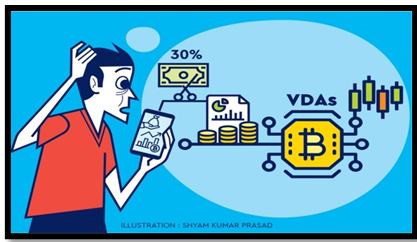WHO CAN REGULATE VDAS?
Syllabus:
GS 2:
- Indian Economy and issues relating to planning, mobilization, of resources, growth, development and employment.
Focus:
- Reserve Bank of India (RBI) maintains a cautious stance on cryptocurrencies.
Source:- Financial express
The dynamic nature of financial markets is evident in the emergence of new products and assets that were unimaginable just a few decades ago. In this context, the blend of regulatory vigilance and the encouragement of innovation becomes crucial for the sustainable growth of digital finance, contributing positively to economic expansion and financial inclusion.
The Role of the Reserve Bank of India and Government Initiatives
- While the Reserve Bank of India (RBI) maintains a cautious stance on cryptocurrencies, it’s important to differentiate between these and other Virtual Digital Assets (VDAs) which can be more feasibly regulated.
- The Indian government’s involvement with the IMF on digital asset regulation and the introduction of a taxation framework for VDAs in the Finance Bill 2022 highlight steps towards a structured regulatory environment.
- These measures aim to extend anti-money laundering regulations to VDA businesses, enhancing market integrity.
Understanding Digital Assets and Their Regulation
- Definition: A digital asset is any creation in digital form with identifiable and valuable attributes, including data, images, videos, content, and audio files, each possessing assignable ownership rights.
- Legal Framework: The Howey Test in the U.S. determines if transactions qualify as investment contracts under securities laws. Applied to VDAs, this test could classify tokens as securities, subjecting them to rigorous regulatory standards.
| VDAs
· Virtual Digital Assets (VDAs) are cryptographic information, code, number, or token with inherent value, excluding Indian or foreign currency. · Examples of VDAs include cryptocurrencies, DeFi, and NFTs. · The Union Budget 2022-23 introduced provisions to tax and monitor VDAs. · VDAs were formally defined under Section 2 of the Income Tax Act, 1961. · From April 2022, India imposed a 30% income tax on cryptocurrency gains. · As of July 2022, rules requiring 1% tax deducted at source on cryptocurrency transactions came into effect |
Leveraging Market Infrastructure Institutions (MII) Regulations
- The Securities and Exchange Board of India’s (Sebi) MII regulations, which cover governance, risk management, and compliance for market entities, are well-positioned to regulate VDAs. Applying these standards to VDA exchanges could ensure robust governance, transparency, and investor protection.
Sebi’s Role in Regulating VDAs
- Sebi’s expertise in financial market regulation, along with its historical success in integrating technology into the equities market, positions it as the ideal authority to oversee VDAs in India. Its ability to enforce standards, coupled with its market intelligence capabilities, would ensure a secure and trustworthy environment for VDA transactions. Imposing criteria for those managing VDA exchanges would further bolster investor confidence in this emerging sector.
The Advantages of Formal VDA Exchanges
Treating VDAs as assets and regulating transactions through formal exchanges offer several benefits:
- Legal Clarity: Categorizing VDAs as assets provides a legal framework for their regulation.
- Investor Protection: Oversight by financial regulators like Sebi ensures compliance with laws aimed at protecting investors and maintaining market integrity.
- Enhanced Governance: Sebi’s regulatory framework would improve the governance standards of VDA exchanges, promoting transparency and fair practices.
Way forward
- India should reconsider its high tax rates on virtual digital assets, which currently exceed those of other asset classes.
- With the new PMLA notification reducing money laundering and terror financing risks, there’s an opportunity to align VDA taxes with other assets.
- Lowering taxes would reduce tax arbitrage, retaining capital, consumers, investments, and talent domestically and shrinking the virtual digital asset grey economy.
- Japan and South Korea have licensed VASPs, and Europe has passed the Markets in Crypto-Assets (MiCA) regulation. India should adopt a progressive regulatory framework to foster innovation and establish leadership in virtual digital assets.
- Crypto assets are borderless, necessitating international collaboration to prevent regulatory arbitrage. Effective legislation requires significant global collaboration on risk evaluation, common taxonomy, and standards evolution.
This condensed version in bullet points retains the original analysis’s core arguments and suggestions regarding the regulation of Virtual Digital Assets in India. It emphasizes the importance of adaptive regulation, the distinction between different types of digital assets, and the potential for leveraging existing regulatory frameworks to ensure market integrity and investor protection.
| Virtual Digital Assets (VDAs) will be covered under the Prevention of Money Laundering Act, 2002 (PMLA).
· Activities involving VDAs include exchanges between VDAs and fiat currencies, exchanges between different VDAs, transfers of VDAs, safekeeping or administration of VDAs, and provision of financial services related to VDAs. · VDAs must register as reporting entities with the Financial Intelligence Unit-India (FIU-IND), which functions similarly to FinCEN in the USA and was established under the Finance Ministry in 2004. · Reporting entity platforms like CoinSwitch are mandated to implement Know Your Customer (KYC) procedures, record and monitor transactions, and report any suspicious activity to the FIU-IND. · These measures align with global guidelines from the International Monetary Fund (IMF) and the Financial Action Task Force (FATF), which define Virtual Asset Service Providers (VASPs) and emphasize their role in regulating and monitoring the VDA ecosystem. |
Source:
Mains Practice Question:
“Examine the challenges and opportunities presented by Virtual Digital Assets (VDAs) in India’s financial market, and discuss the role of regulatory bodies like the RBI and SEBI in fostering innovation while ensuring investor protection.”




